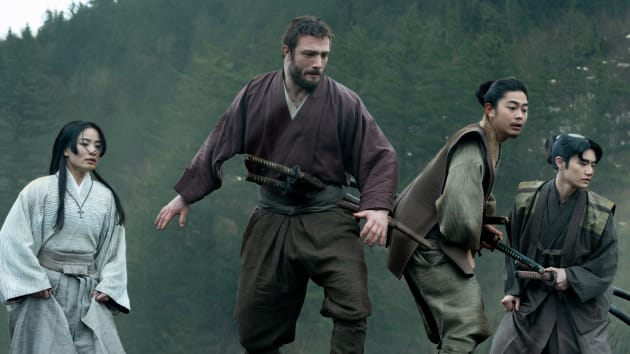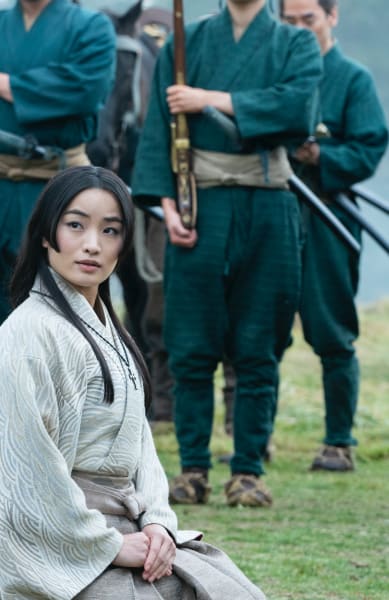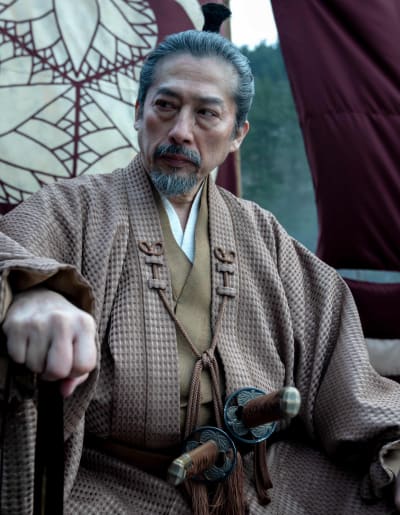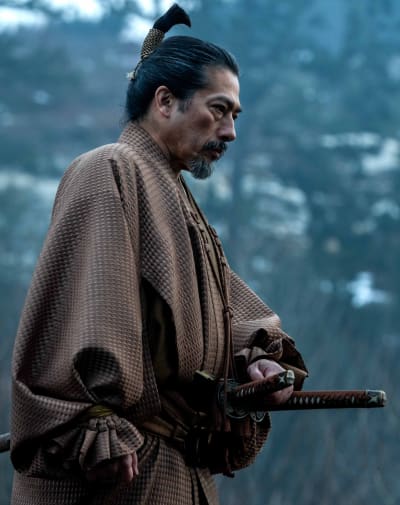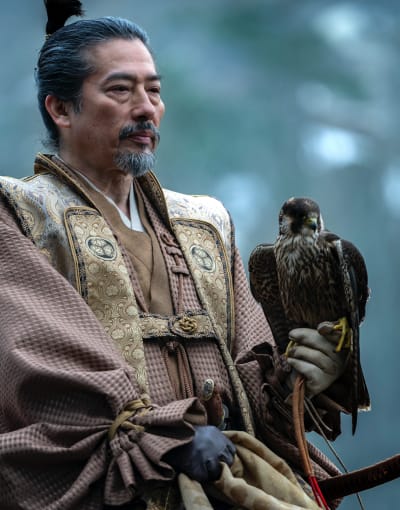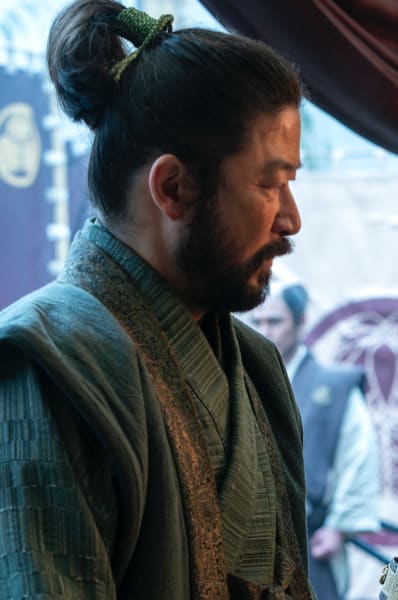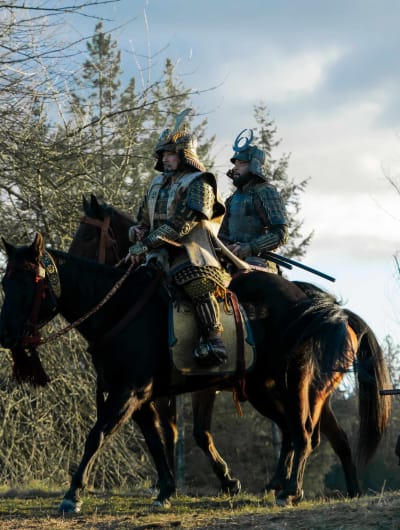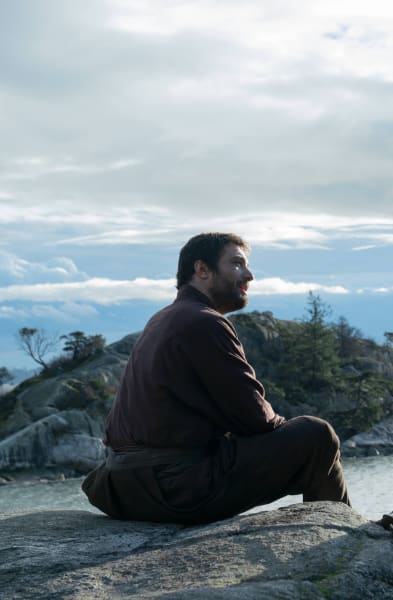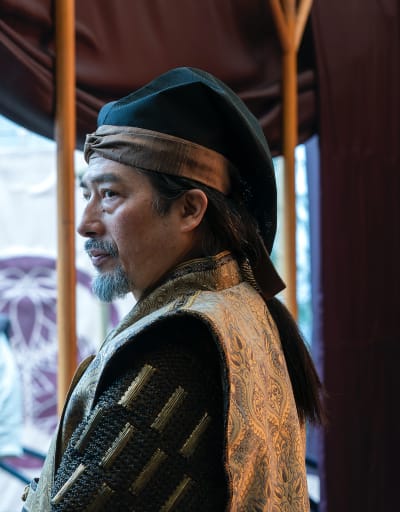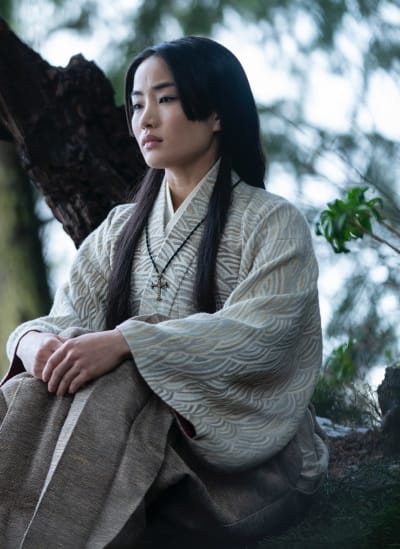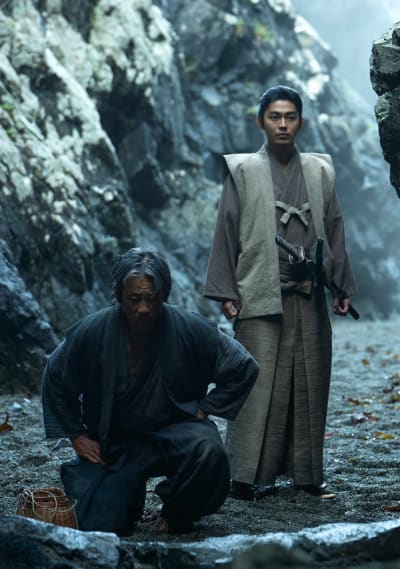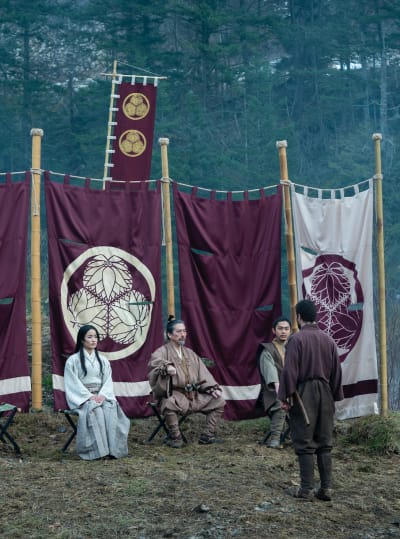If you’re a fan of Shogun’s willingness to “go there” in its depictions of the brutality of 17th-century combat, then you probably derived a sort of grim pleasure from the end of The Eightfold Fence and the beginning of the latest episode.
Others, however, may have found it difficult to watch as Ishido’s men were obliterated with cannons, and their gory remains were then loaded into wagons.
It’s a sentiment likely shared by the peasants of Ajiro, who have been tasked with cleaning up the remnants of the massacre, and who are all too aware that their village is soon to be torn apart by war.
When a procession of troops arrives on the scene in the opening minutes of Shogun Season 1 Episode 5, we (and presumably the peasants) initially assume that it’s Ishido, come to exact his revenge for the death of Jozen and, like, 100 or so of his loyal vassals.
Instead — well, we wish we could say that the ensuing twist knocked us out of our seats, but did anyone really believe that Buntaro had been killed?
After all, rule one of TV character deaths is “if it happened offscreen, it didn’t happen.”
More importantly, does anyone really care that this guy is still alive?
Shogun has been nigh-flawless so far, but the resurrection of a guy who’s had like five minutes of screentime and used most of them to verbally abuse his wife may not have been the pre-credits shocker the writers were hoping for.
Anyway, the return to Osaka promises a return to what this show does best — political intrigue!
The Heir’s mother, Lady Ochiba, is making her way home, and with all ties to Toranaga severed, the Council of Regents is ready to impeach his ass.
Unfortunately for them, he’s already resigned, a brilliant bit of maneuvering that requires the Council to find a pliable replacement so that they can secure the five votes necessary to fire the wayward regent and compel him to commit seppuku.
As Toranaga likely anticipated, the regents’ conflicting loyalties and agendas will make the selection of a replacement a long and tedious process.
Speaking of long processes, it apparently took 20 days for Buntaro to fight his way back to his wife, who seems less than thrilled by his return.
We guess that stands to reason as, 1. Buntaro is a jerk, and 2. Mariko moved on and pillowed with Blackthorne about a week after her husband went missing.
We’ll forgive the producers of Shogun for keeping Buntaro’s miraculous journey of survival off-camera. It’s easy to forget, given some of the stunning visual feats they’ve performed thus far, but they are still working with a TV budget.
Plus, the courageous battles of a raging D-bag like Buntaro might have quickly grown tedious. But most importantly, we get the sense that the decision to withhold the details of his exploits was a strategic one that will later work to the show’s advantage.
Mariko’s situation is further complicated by the news that Toranaga expects her to live under one roof with Buntaro and Blackthorne in order to carry on her spying/translating duties.
It’s like a wacky ’70s sitcom premise! Of course, we guess the strong likelihood of someone dying a violent death sort of undermines the comedic potential.
Speaking of disappointing relatives, Toranaga is rightly furious at Nagakado for killing Jozen, a move that will likely plunge the country into civil war.
After uttering the episode’s titular line and making some cool falcon analogies, Toranaga strips Nagakado of his command of the cannon regiment.
You so easily fell for their trap. Broken to another man’s fist. Like a falcon without the beauty.
Toranaga
Once again, we’re left marveling at this show’s ability to introduce subtextual thematic elements without ever stealing momentum from hyper-intricate plot mechanics of a variety seldom even attempted on television.
The episode titled Servants of Two Masters set the stage for the entangled loyalties that are now creating such tension for Mariko and Nagakado, and it was a stroke of storytelling genius to have Toranaga address both matters in rapid succession.
Ishido receives word of Jozen’s death in typically grisly fashion, and after some more culture shock comic relief, we’re reminded that Buntaro is a very scary dude.
He’s not a fan of the Anjin or his new status as hatamoto. Buntaro was always someone you don’t want to cross, but here, we’re given the sense that his brush with death has made him even more dangerous.
Folks with one foot each in two different worlds are all over this episode, as Yabushige then attempts to convince Toranaga that he’s not a double agent who also serves Ishido.
Of course, no one has more irons in the fire than Toranaga, who now reveals that he’s a fan of the plan to provoke Ishido into attacking.
He further confuses Yabushige by praising Omi for the strategy and rewarding him with command of the cannons.
This guy is playing 3D chess, and we’re forced to pause once again and praise Shogun’s writers for delivering some wildly intricate plotting in such a way that the viewer is never at a loss and seldom feels anything other than wholly swept up in the momentum of this epic saga.
For example, while the hierarchical structures of feudal Japan might be unfamiliar to us, we’re aware of the power dynamic in scenes like the one between Omi and Yabushige, who makes it clear that the cannon regiment still belongs to him in everything but name.
Not surprisingly, Blackthorne and Buntaro (excuse me, Lord Toda) don’t exactly hit it off, but as translator, Mariko is able to run interference and keep the men in her life from killing each other (and roasting one another for their table manners).
The rough waters of colliding cultures and the ways in which language can enable us to navigate those seas are some of this show’s favorite themes, and never have they been encapsulated quite as neatly and hilariously as in the saké-drinking contest between the Anjin and his host.
Proving once again that this series can mine supreme badassery from the most mundane circumstances, Blackthorne delivers a toast for the ages, and a drunken conversation about war soon gives way to a horrifying — albeit pretty cool — display of marksmanship.
But what’s more impressive than Buntaro’s skill with a bow is how much this scene manages to reveal about his character.
He thinks nothing of the wife whom Blackthorne seems to be falling in love with, and unlike so many others who have been charmed by the barbarian’s rough charisma, this is not a man who will be easily won over.
Once again, Mariko edits Blackthorne’s response for his own sake, but this time, for the first time, she shows a shred of self-interest. And she’s promptly made to pay for it.
She’s forced to recount to Blackthorne her unspeakably tragic backstory, and she tops it off with the revelation that Buntaro denies her even the relief that would come with committing seppuku.
Mariko urges Blackthorne to remember the eightfold fence (translation: don’t murder my jerk-ass husband, even though you’re drunk and furious) and boldly excuses herself over protests from Buntaro.
We know that Blackthorne has seen a great deal in the years he spent sailing the unexplored reaches of the New World — but it seems that none of it has left him so furious as Buntaro’s assault on Mariko.
Sadly, we’re denied a satisfying clash of gun versus sword when Buntaro takes a page from the book of Jamie Foxx and blames it on the alcohol.
But the furious samurai also fixes Blackthorne with a deadly Kubrick stare as he exits the scene — as though we needed another indication that the rivalry between these two is far from over.
Toranaga continues to play puppet master by refusing to allow his spy to surrender, and the villagers begin to suspect that a tatarigami has taken up residence in the Anjin’s house.
The term roughly translates to “curse god,” and as Mariko’s description of the ignominious death of Fuji’s father illustrates, it’s sadly accurate.
Everyone in Blackthorne’s house is indeed living with a darkness so profound it might best be understood by picturing an animate malicious presence.
Blackthorne recognizes that no one is suffering as mightily as the two women who have taken up his cause, but Mariko feels that the cultural differences that inform their disparate belief systems are too great to ever be overcome.
The episode takes yet another dark turn as the aging pheasant that had served as a sort of wry comic relief throughout the episode takes on a much bleaker meaning.
Taking Blackthorne’s words far too literally, Fuji has the gardener Uejiro for the crime of discarding the foul-smelling bird.
Blackthorne’s despair over the meaningless death of Uejiro and the fashion in which Mariko downplays the matter to Toranaga underscores the fact that for all their initial connection, the gap between the worldviews of these erstwhile lovebirds is more like a gaping chasm.
But Mariko’s explanation of the thought that was given to the matter and the way that Blackthorne set the events in motion with his own words gives meaning to what initially seemed a senseless tragedy, and highlights the sensitivity with which this show explores its character’s clashing cultures.
The tables turn so abruptly that Blackthorne, who had been furious moments earlier, finds himself overcome with guilt for his role in the old gardener’s death.
It’s the sort of stunning reversal that Shogun has pulled off several times thus far, but that continues to impress.
The earthquake that nearly kills Toranaga, badly injures Fuji, and provides an opportunity to frame a dead villager might have seemed like a random deus ex machina were it not for the fact that Mariko previously set the stage by alluding to the frequency of such disasters.
In the end, Uejiro’s sacrifice was even greater than it initially seemed.
And in a story bookended by birds — Toranaga’s falcon and Blackthorne’s pheasant — the elderly servant proved that a life of service can also be one of bravery and beauty — even if the servant’s loyalties are not always clear, even to himself.
The episode concludes with Ochiba using her power as the future Taiko’s mother to declare her authority over the Council of Regents — a poignant reminder that everybody serves somebody.
(And a cathartic ending to an episode in which multiple women were cruelly abused by powerful men.)
From the standpoint of plot advancement, this may have been the slowest episode of Shogun thus far.
But for all that it revealed about the characters of our principal players, the tensions between them, and the cultures and backstories that inform their worldviews, it may have also been the most riveting.
If this was an episode whose main purpose was “place-setting” for the conflicts to come, then it’s all the more impressive for its ability to set that stage while also delving deep into the subtextual themes that do so much to elevate this show so far above its peers.
What do you think, TV fanatics? Was this the strongest episode of Shogun to date? Are you more invested than ever in these characters and their fates? Hit the comments section below to share your thoughts.
Tyler Johnson is an Associate Editor for TV Fanatic and the other Mediavine O&O sites. In his spare time, he enjoys reading, cooking, and, of course, watching TV. You can Follow him on X and email him here at TV Fanatic.
